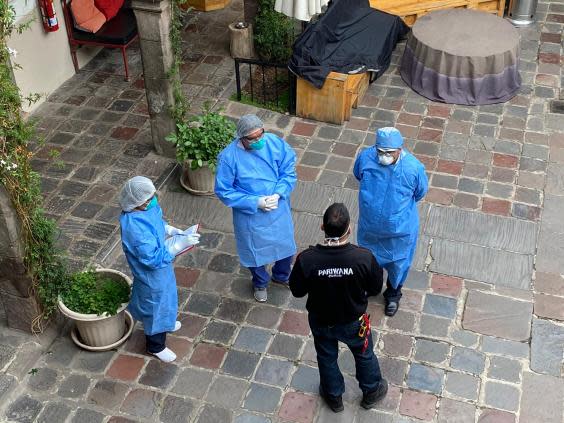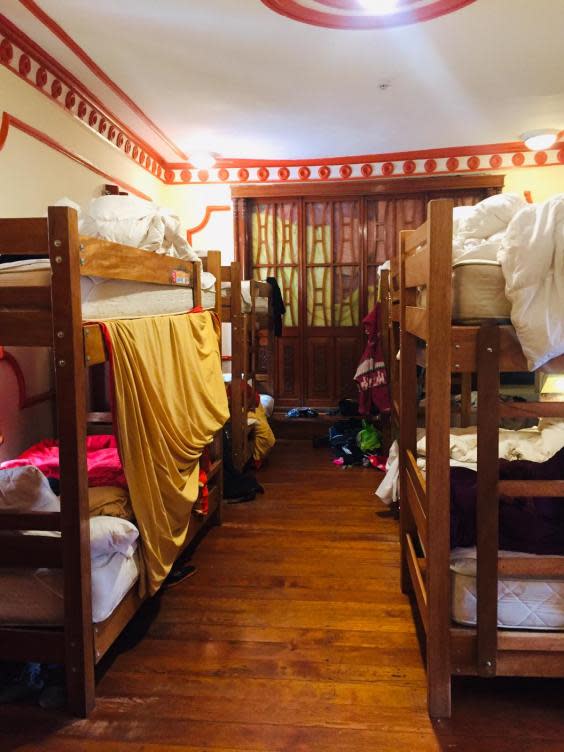‘We just want to go home’: The British nationals trapped in Peru due to coronavirus

When Siân Forkan embarked on a three-month trip to South America in February, she couldn’t have known that it would end with her being confined to a hostel room for 23 hours a day, with the threat of a five to 10 year prison sentence if she defied the Peruvian army’s strict rules.
Forkan, a HR assistant from Manchester, is one of the 140 people being held in the Pariwana hostel, in Cusco, as a result of Peru shutting its borders to contain the spread of the coronavirus. The group includes eight other British citizens and one Irish national.
“It’s been very surreal,” Forkan said, as the group reached its 12th day in quarantine. “We were given 24 hours to leave the country when they first announced the lockdown which obviously caused absolute chaos. When we realised we were too far away to get to the airport, we had to beg the hostel we’re now in to let us stay here after they initially refused.” After some tears, the Pariwana agreed and Forkan has been there since.
Forkan said initial measures being enforced by the local police and army weren’t “too bad”. It was on Sunday, when two people staying at the same accommodation tested positive for Covid-19, that rules became sterner.
“We’ve been told we can’t leave our rooms for more than one hour a day and if we’re seen trying to escape, we risk being sent to prison for a minimum of five years,” she said. On Wednesday night, a girl was caught trying to jump the hostel’s fence in an attempt to flee to the nearest airport, but was stopped by police and told to return to her room.
According to Forkan, those trapped at the hostel have been advised they should expect to be there for “a minimum of a month, possibly three”. There has been no explanation for these time estimations, though, which Forkan said is something she and others have been trying to contact the government and local British Embassy about.
Forkan embarked on the backpacking trip with Abi Dennison, an ITU nurse for the NHS, who she is also being quarantined with. Dennison said the most “logical thing for Peruvian officials to do” would be to test all 140 hostel residents and send home the ones who test negative, but pointed out this “won’t be possible in a third world country considering the UK isn’t even able to test everyone”.
Dennison, who is usually based in Nottingham, said the most frustrating thing about being stuck abroad is the knowledge that she could be at home, helping people fight the virus in her day job. She said: “Everyone in the hostel was clapping for me yesterday as part of the #ClapForTheNHS movement, but I just feel like a fraud sitting here doing nothing. I want to get home so I can help others, but that won’t happen if we’re stuck here for another three months.”
All the way from Peruvian lockdown, ITU nurse @abidennison and @SianForkan doing their bit and taking part in the #ClapForTheNHS ! @FCOtravel @DominicRaab @EmilyThornberry, COVID is present in their hostel – please help bring them home! #ukstuckinPeru @ukstuckinperu pic.twitter.com/ER4HK9UH8m
— Lucy (@FemaleAtLarge)
There are an estimated 700 Britons currently trapped all over Peru, struggling to find feasible ways home. Since the South American country, which is a popular backpacking destination, announced it had entered a state of national emergency and shut its borders almost two weeks ago, the British government has been under intense scrutiny to fly all those from the UK home. An online petition campaigning for Foreign Secretary Dominic Raab to ensure their safe return has now reached over 44,800 signatures.
Jyoti Madlani, a senior account manager who lives in London, is in the same hostel as Forkan. She also left the UK for South America in February, while on a three-month sabbatical from work.
Madlani said that compared to other people in the hostel who come from countries such as Switzerland, India and Germany, Raab and the entire British government have “failed to make any of us [British people] here feel safe or even heard”. She said: “There are people here whose home countries have sent them care packages, responded to their emails and calls, and generally made them feel safe. All we’ve got is bulls**t automated responses to emails and social media callouts.”
When The Independent reached out to the Foreign Office, it received the same automated response, quoting Foreign Secretary Dominic Raab: “The Foreign Office has chartered three more flights for British travellers in Peru - as well as domestic flights to help those in Cusco. We continue to work around the clock to help British travellers struggling to get back to the UK and thank the Peruvian government for all their support in making this happen.”
The local Indian Embassy has assured its stranded citizens that all accommodation and food would be covered for them, Indian travellers in the hostel have told Madlani.
“Surprise, surprise, we are yet to hear anything from [the British government] about this or anything else that is going on.”

Last week, Kate Green, the Labour MP for Stretford and Urmston, raised the issue of those stuck in Peru to Raab in parliament. He assured Green: “We will look to do everything we can to provide support and advice for those that need it to return them.”
“It would just be nice to hear a human voice, to know they’re doing all they can and that they care,” Forkan said. “Instead we’ve just had the one programmed response saying the government is aware of what’s going on. Our family and friends said they’ve heard nothing either.”
Watch my question to @DominicRaab on behalf my constituent currently stranded in #Peru following border closure. 👇
I've also been in touch with the consulate to ask them to provide urgent support @UKinPeru #coronavirus pic.twitter.com/CJTPIltOfK— Kate Green (@KateGreenSU)
Those stranded and their families have created a Twitter account, with the username @ukstuckinperu, to raise awareness of the situation and demand that both the Foreign Office and Peru’s British Embassy take action. The Embassy in particular is facing backlash for closing its doors when the lockdown was announced in Peru. Both its phone number and email, which British nationals like Forkan are being told to contact, are either generating automated responses or ringing out, those stranded say.

Kate Harrison, the British Ambassador to Peru, has been bombarded with requests to respond to questions and calls for help made by those stuck in Cusco, Lima, Iquitos, as well as Peru’s second largest city Arequpia where 44 others are stranded. Harrison told The Independent that her “complicated schedule” meant she couldn’t comment on the current situation. The embassy did not reply to request for further comment.
Harrison took to her Twitter account on Wednesday to praise British Airways for flying roughly 200 British nationals home on the first repatriation flight from Lima, and shared a video message on Friday to give an update on what she described as the process of sending home those “who wanted to return to the UK”.
The ambassador did not disclose how the hundreds of people trapped in their hostels, unable to leave and make the journey from places like Cusco (a 20-hour coach ride or one-and-a-half-hour plane journey from Lima), can hope to make the journey to Lima and be sent back to London.

Peru’s British Embassy announced on Friday, via its Twitter page, that two additional BA flights had been chartered to “continue helping British nationals get back home”. But Forkan and Dennison said they aren’t hopeful they’ll be on either plane, unless they’re tested and can “hopefully” prove they’re negative and so not at risk of spreading the disease.
Meanwhile Madlani, who once worked as a psychological well-being practitioner, said: “It’s only a matter of time before all of this starts taking a massive toll on our physical and mental wellbeing.”
“We just want to go home,” Forkan and Dennison said. “And the longer we’re left in this hostel, which is now a breeding ground for the virus, the less likely that is of happening.”
Read more
How to help the elderly and vulnerable during the coronavirus
How to feel less anxious about the coronavirus
How to be productive when working from home during coronavirus


